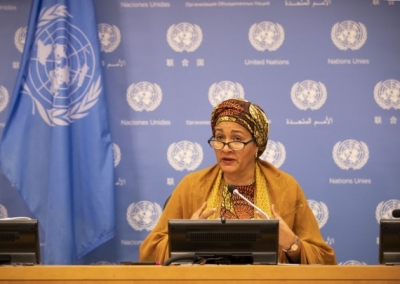UN Deputy Secretary-General Amina Mohammed warned that the world is facing a “bloody surge” in humanitarian crises while calling on member states and the Security Council to do everything possible to end attacks.
“We are facing a bloody surge in humanitarian crises around the world. Civilians in conflict zones are paying the highest price,” the UN deputy chief told a Security Council ministerial-level briefing on Friday.
Advertisement
Briefing on behalf of the Secretary-General, Mohammed said that this year the UN and its partners are seeking to assist 160 million people – its highest number ever reports Xinhua news agency.
The “hurricane of humanitarian crises” is compounded by a “relentless wave of attacks” on humanitarian and medical workers, and the imposition of ever narrower constraints on humanitarian space, according to the UN deputy chief.
“The Secretary-General urges this Council to take strong and immediate action to support its numerous resolutions on the protection of civilians, humanitarian and healthcare workers, and humanitarian space,” she told ministers and ambassadors.
Shootings, bodily and sexual assault, kidnappings, and other attacks affecting humanitarian organizations, have increased tenfold since 2001, according to Mohammed.
“In the five years since this Council’s landmark resolution calling for an end to impunity for attacks on healthcare systems, workers and patients have suffered thousands of attacks,” she said.
Meanwhile, it is becoming ever more difficult to provide vital humanitarian aid to people in need.
“Turbo-charged” by Covid-19, humanitarian needs are outpacing the capacity to meet them, said Mohammed.
While the UN engages in difficult negotiations to create lasting ceasefires and build sustainable peace, the delivery of life-saving humanitarian aid must continue, and that requires the necessary humanitarian space.
Member states and the Security Council have “a responsibility to do everything in their power” to end attacks on humanitarians and assets, and seek accountability for serious violations, the UN deputy chief underscored.









